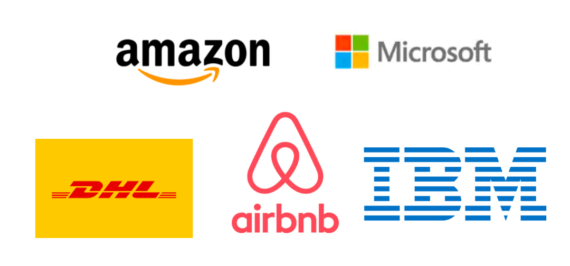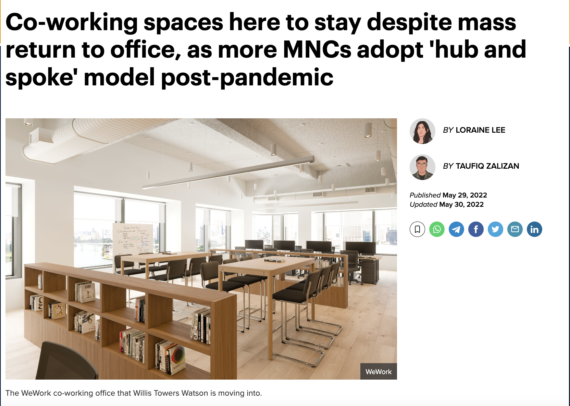Coworking spaces began as a solution for freelancers and start-ups. But these days, more SMEs and MNCs are opting to put some, if not all of their employees in coworking spaces. Coworking space providers also say MNCs now make up a significant portion of their member base.

These global companies have made the switch to coworking spaces:

One prime example in Singapore is Willis Towers Watson (WTW), a British-American risk management insurance company that ended its traditional office lease at One Raffles Quay and shifted into a WeWork instead. When surveying their employees, 97% of 265 workers said they’d prefer a hybrid work arrangement.
The advantage of using such a (coworking) model is that it provides us with the ability and flexibility to adapt to changing business needs quickly without a big upfront investment. The membership to use the space is also shorter and we can scale up easily and quickly if we need additional space within the central business district.
 TodayOnline.com
TodayOnline.com
How does the pay-as-you-grow model benefit large multinationals who enjoy much greater consistency? There are several reasons, as many other companies who’ve hopped onto the coworking bandwagon are well aware.
Cost Savings
With rent prices on the rise in Singapore, the balance is tipping towards more flexible real estate options for many companies. Coworking offices offer fully furnished spaces with already built-in amenities and flexible, shorter lease terms starting from six months only. This benefits companies who are new to Singapore and want to “test the market” first. Easy scalability is also a huge advantage, allowing companies to quickly expand their office size if they need too.
On the other hand, traditional office leases are expensive to set-up (furniture, design, office equipment, internet, utilities, management fees, cleaning, insurance, taxes and a myriad of other headaches…). Traditional offices require longer contracts and paying large penalties in the event of termination.
Work Life Balance
More employees are demanding a healthier work-life balance — both those with families and millennials. Be it saving on commute time or choosing to work from home on some days, flexibility and freedom is key for today’s workforce. Coworking spaces are thus a good way for corporations to maximise efficiency and minimise under-utilised space.
Inspire Employees
Research shows that people in coworking spaces report higher levels of thriving — they are more engaged in their work and are generally more productive. This is because they can choose their working hours, they feel part of a community and the opportunities for collaboration encourage creativity. When surrounded by people with different expertise, their own identity and confidence in what they do grows stronger.
Networking, Recruit Talent
Coworking spaces bring people of all industries and skill-sets under one roof — perfect for recruiters. The networking opportunities and community activities offered make it easy to forge partnerships and create new business connections.
Monitor Competition
They also make it easy to keep track of innovations and potential disruptions to the industry. Many companies choose to have teams located in coworking spaces, at the heart of the start-up action, to find out about potential competition or acquisition targets.

Coworking spaces are becoming more relevant for large organisations, whether they’re being used as an alternative workspace for convenience, a base for sales teams and overseas teams, or as a model to follow when re-designing existing company offices.
If you still need more great reasons on why coworking spaces could be the smarter choice than traditional offices in today’s world – read my post 6 Biggest Coworking Myths Debunked!
Interested in finding a private coworking office space for your company? Contact me for your complimentary solutions service. Find out how a flex space specialist like myself can help you in your search here.
co-workingCoworkingcoworking spaceoffice spaceworkspace










What do you think?